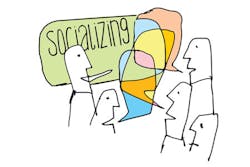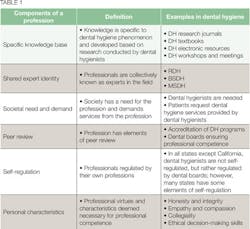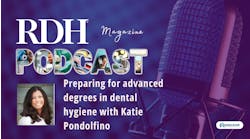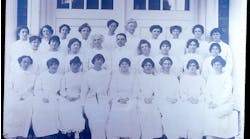Socializing: A critical need for professional socialization exists in dental hygiene
By CHRISTINE NATHE, RDH, MS
Many times, dental hygienists decide to work for the advancement of the profession with motivation and enthusiasm, only to realize after starting that it is difficult to get other dental hygienists on board. I often think of our discussions in Michele Darby’s graduate classes on the need for professional socialization (see author’s note at end of article). When socialization occurs, relationships develop, which in turn help the profession grow and evolve.
Professional socialization could be defined not only as working together as professionals to advance the science and practice of dental hygiene and promote oral health within communities, but also the ability to socialize with individuals in the same profession. Professional socialization involves the sharing of a professional identity.
When professionals socialize - whether during their training, participation in a community initiative, while taking a continuing education course, or attending a dinner meeting - they have time to discuss their profession and develop their skills and values together. Professional socialization can enhance the collective voice of their profession and sense of unity. Professions are able to flourish when individuals within that group actively communicate and foster relationships.
Dental hygiene socialization
Recently, I was visiting with a dental hygiene icon who happens to live in New Mexico: Irene Navarre, RDH. Irene is a past ADHA president and one of the dental hygienists who started the hygiene program at the University of New Mexico. She is 99 years old and still mentoring us in New Mexico! We were discussing some of the early initiatives to develop the dental hygiene association in her area. One dentist instructed her to make sure that dental hygienists had dinner meetings and professional workshops. He believed that if dental hygiene were to develop as a profession, the voice needed to be strong, unified, and cohesive. Evidently, he understood the importance of professional socialization. Although many of my conversations with Irene motivate me, this topic, in particular, resonated with me.
I thought of Michele Darby’s persistent message of the importance of professional socialization. If we are to grow as a profession, we need to develop our skills and values together. We need to have professional relationships and consistent communication. If we want to progress, this needs to be a priority.
Solidifying our position
There are various ways to describe a profession, but most descriptions contain the following components: specific knowledge base and shared expert identity, societal need and demand, peer review elements, and self-regulation. Professionalism also includes personal characteristics such as honesty, integrity, collegiality, empathy, and ethical decision-making skills, to name a few (see the related table).
The specialized body of knowledge indicates that dental hygienists have a specific knowledge base created by research conducted by dental hygienists. The professional hallmark of a cadre of experts in the field, such as the RDH, highlights the existence of clinical and educational standards, which creates a shared identity. Societal need and demand suggests the population needs dental hygiene care provided by dental hygienists and that society is demanding that particular service.
Peer review can be described as the accreditation of dental hygiene programs and clinical standards from the profession, such as the ADHA Clinical Standards of Practice. Self-regulation occurs when the profession is regulated by the profession, which most states do not enjoy. All of these components involve dental hygienists working together and being involved in professional socialization. Understanding the elements of a profession is important when developing solutions on the growth of professional socialization.
The medical profession did not always have a strong voice in the United States. Early in American history, physicians were not educated in accredited, academic institutions as they are today. In fact, back then, the prestige of the medical profession was low, and medical practice lacked uniform educational and practice standards. When communicable disease outbreaks occurred, policymakers did not listen to physicians, who could have been helpful in preventing further issues.
But again, physicians lacked a respected voice. With the advent of accredited medical academic institutions, advanced education, and documented clinical standards, we now witness a socially accepted respect and prestige for physicians and a much higher expectation for medical care than we had in the past.
Historically, the American Dental Association has had a strong and unified voice for dentistry. This has been a strength of dentistry and has served the profession well. Dentists have a collective voice in local, state, and national decisions. Most Americans trust dentists and respect the profession. The dentist who explained the need for dental hygiene professional socialization to Irene understood the implications well.
Next steps
Dental hygiene meets most of the tenets of professionalism, but how do we move further ahead, and how does professional socialization fit into this movement? Dental hygiene as a profession must understand why dental hygienists do not unite in an organized manner, nor do many dental hygienists actively seek out socializing with other dental hygiene providers. Professional socialization of dental hygienists does not mean that every dental hygienist must attend every local, state, or national meeting, nor does every dental hygienist need to participate in social media blogs or groups or become an officer of an association, although I do think these activities are important.
We need to recognize the importance of professional relationships and understand how they help us be better dental hygienists and unify our professional identity. Socializing professionally - whether at meetings, courses, community initiatives, or via social media sites - can help us grow.
Dental hygienists must actively seek out mentors, friends, and colleagues so that communication with other dental hygienists flourishes. In personal life, relationships need time to grow, develop, and mature; the same is true of professional relationships. Making memories is one of the best parts of family vacations, because memories bind us together as a strong family unit. If dental hygiene is to be a strong and growing profession, it is necessary to carve out time for dental hygiene meetings so that memories develop and bind us!
Socializing is necessary with family and in friendships, so why would it not be necessary in professional relationships? Dental hygienists must work actively to stay involved and connected, as we are all members of this profession. Most would agree that each one of us wants to be the best we can be at work, and to do this, we must value professional growth, which can only be improved with socialization among other dental hygienists. Although there will always be professional differences of opinion, professional socialization is necessary, because we are strongest when we work together, not when we are easily divided.
Author’s note: Michele Darby, RDH, MS, who passed away in 2015, was an eminent scholar at the Old Dominion University Gene W. Hirschfeld School of Dental Hygiene. Her dental hygiene textbooks are used worldwide, and she was instrumental in advancing the science and practice of dental hygiene. Her most profound contributions were to the research movement in dental hygiene and the invaluable mentoring role she provided to numerous dental hygienists. RDH
CHRISTINE NATHE, RDH, MS, is director at the University of New Mexico, Division of Dental Hygiene, in Albuquerque, N.M. She is also the author of “Dental Public Health Research” (pearsonhighered.com/educator), which is in its third edition with Pearson. She can be reached at [email protected] or (505) 272-8147.
References
1. Irene Navarre, RDH, ADHA Past President
2. Amyot CC. The Evolution of Dental Hygiene Education: A Centennial Celebration of Dental Hygiene. Dimensions of Dental Hygiene. 1913-2013;46-48, 50, 52, 54-55.
3. Bowen DM. Dental hygiene: a developing discipline? Dent Hyg. 1988;62(1):23-25.
4. Biller-Karlsson I. Dental hygiene: a field of study. Dent Hyg. 1988;62(1):20-22.
5. Pickett GE, Hanlon JJ. Historical perspectives. In: Public Health: Administration and Practice. 9th ed. St Louis, MO: Times Mirror/Mosby College Publications; 1990:21-46.








